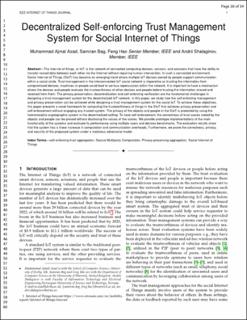Decentralized Self-Enforcing Trust Management System for Social Internet of Things
Peer reviewed, Journal article
Accepted version

Åpne
Permanent lenke
https://hdl.handle.net/11250/2780298Utgivelsesdato
2020Metadata
Vis full innførselSamlinger
Sammendrag
The Internet of Things (IoT) is the network of connected computing devices that have the ability to transfer valued data between each other via the Internet without requiring human intervention. In such a connected environment, the social IoT (SIoT) has become an emerging trend where multiple IoT devices owned by users support communication within a social circle. Trust management in the SIoT network is imperative as trusting the information from compromised devices could lead to serious compromises within the network. It is important to have a mechanism where the devices and their users evaluate the trustworthiness of other devices and users before trusting the information sent by them. The privacy preservation, decentralization, and self-enforcing management without involving trusted third parties are the fundamental challenges in designing a trust management system for SIoT. To fulfill these challenges, this article presents a novel framework for computing and updating the trustworthiness of participants in the SIoT network in a self-enforcing manner without relying on any trusted third party. The privacy of the participants in the SIoT is protected by using homomorphic encryption in the decentralized setting. To achieve the properties of self-enforcement, the trust score of each device is automatically updated based on its previous trust score and the up-to-date tally of the votes by its peers in the network with zero-knowledge proofs (ZKPs) to enforce that every participant follows the protocol honestly. We evaluate the performance of the proposed scheme and present evaluation benchmarks by prototyping the main functionality of the system. The performance results show that the system has a linear increase in computation and communication overheads with more participants in the network. Furthermore, we prove the correctness, privacy, and security of the proposed system under a malicious adversarial model.